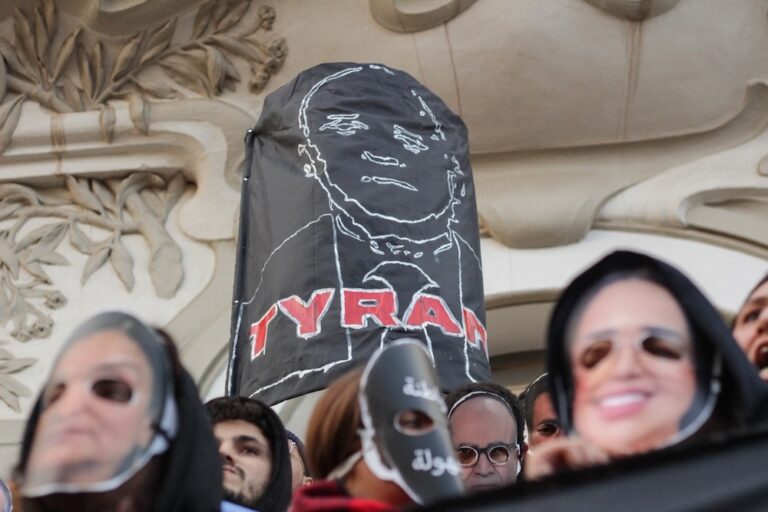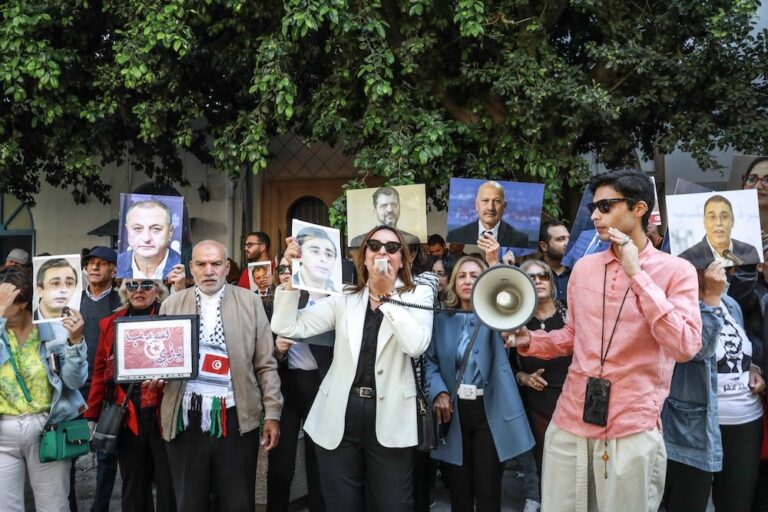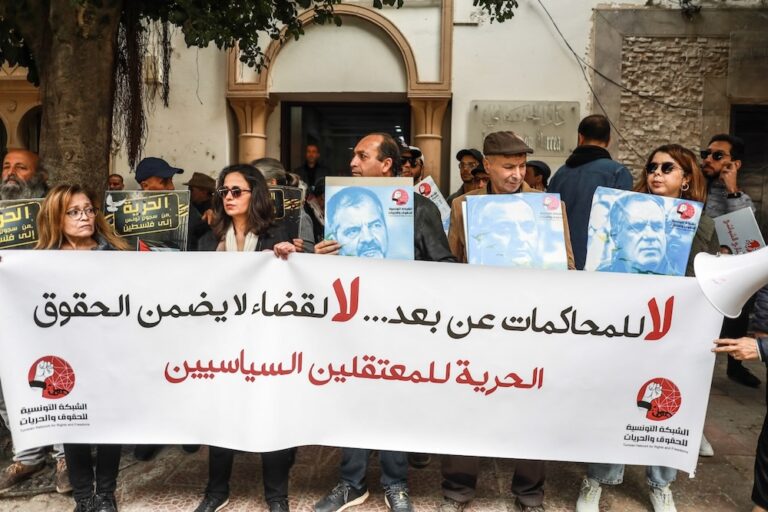Human Rights Watch calls for the revision of laws that set prison terms for “offending public morals”.
(Human Rights Watch/IFEX) – Tunis, April 6, 2012 – The seven-year prison terms handed down on March 28, 2012 to two Tunisians for publishing writings perceived as offensive to Islam are examples of the need to repeal repressive laws dating to the Ben Ali era, Human Rights Watch said today.
One of the men, Ghazi Ben Mohamed Beji, published an excerpt in July 2011 entitled, “The Illusion of Islam,” taken from an essay he wrote on www.scribd.com, a free “social publishing” website. In the introduction, he says his intent is to show “the ugly face of Islam.” The essay satirizes aspects of the Prophet Muhammad’s biography, crudely deriding his sexual life. The other man, Jaber Ben Abdallah Majri, published photos on his Facebook page containing caricatures of the Prophet drawn from Beji’s book, along with satirical writings about Islam and the Prophet.
“As long as these repressive Ben Ali-era laws are on the books, authorities will have the temptation to use them whenever politically convenient,” said Sarah Leah Whitson, Middle East and North Africa director at Human Rights Watch.
The First Degree Court in the city of Mahdia handed down the prison terms and fines of 1,200 Tunisian dinars ($US 790). The men, both 28, were charged and convicted together by the Mahdia court for publishing materials “liable to cause harm to public order or public morals,” under article 121(3) of the penal code, an article adopted into law in 2001.
Majri has been in prison in Mahdia since March 5. Beji, who fled to Europe on March 9, was convicted in absentia.
The case is at least the third in which authorities have brought charges for speech deemed offensive to Islam or morality since the country’s new National Constituent Assembly convened in November 2011.
The prosecution of Majri and Beji followed a complaint filed on March 3 by a Mahdia lawyer, Foued Sheikh Zaouali. He contended that Majri had caused “harm to the Prophet by photos and writings and harm to the sacred values of Islam causing fitna (division) between Muslims.” The lawyer told Human Rights Watch that he filed the complaint after visiting Majri’s Facebook page and finding the caricatures. The original complaint only concerned Majri, who was arrested on March 5 and appeared before the investigating judge the same day.
Based on the transcript of Majri’s interrogation obtained by Human Rights Watch, he said that the photos and writings on his Facebook page reflect his atheism and his lack of belief in Islam. Appearing before the investigating judge a second time on March 7, Majri stated that he intentionally harmed the image of the Prophet and Islam by publishing cartoons given to him by Beji, a friend of his, and apologized, the transcript says.
On March 9, the First Degree Court of Mahdia initiated a criminal investigation of Majri and Beji for “harm to public order and to public morals” on the basis of articles 121(3) and 226 of the penal code, and article 86 of the Telecommunications code.
The penal code’s article 121(3) makes it an offense to “distribute, offer for sale, publicly display, or possess, with the intent to distribute, sell, display for the purpose of propaganda, tracts, bulletins, and fliers, whether of foreign origin or not, that are liable to cause harm to the public order or public morals.” Article 226(2) says that a person found guilty of undermining public morals by “intentionally disturbing other persons in a way that offends the sense of public decency” can be sentenced to prison. Article 86 of the Telecommunications code, adopted in 2001, provides for a prison term of one to two years and a fine of up to 1,000 dinars for “harming others or disrupting their lives through public communication networks.”
Beji had already encountered problems because of statements and behavior reflecting his atheist views. He told Human Rights Watch by telephone:
On March 5 a relative informed me that my friend Jaber Majri was arrested in Mahdia because of his writings [that were] deemed blasphemous. I decided to flee to Libya but I stayed only one day there because the situation there didn’t feel secure. So I returned to Tunisia. On March 9 I was at my grandparents’ house when my mother called to advise me not to come back home because the police were searching our house and looking for me. I decided to escape.
I was already worried about my safety because weeks earlier I had started receiving threats through anonymous telephone calls and being insulted on the streets. I felt like a pariah as my friends turned against me. I first went to Algeria, but I didn’t feel safe there so I decided to cross to Turkey, and from there to Europe.
Beji, an agronomist, said he decided to write his book after he was fired from his job in a railway station and then from a factory job. He attributed his dismissals to colleagues who did not accept his atheism and his remarks critical of Islam, and his refusal to fast during the month of Ramadan.
Judged in absentia, Beji is entitled under Tunisian law to a new trial if he surrenders to authorities. However, the judge could decide to place him in pretrial detention, as the judge did in Majri’s case. Majri has since appealed this sentence.
(. . .)


